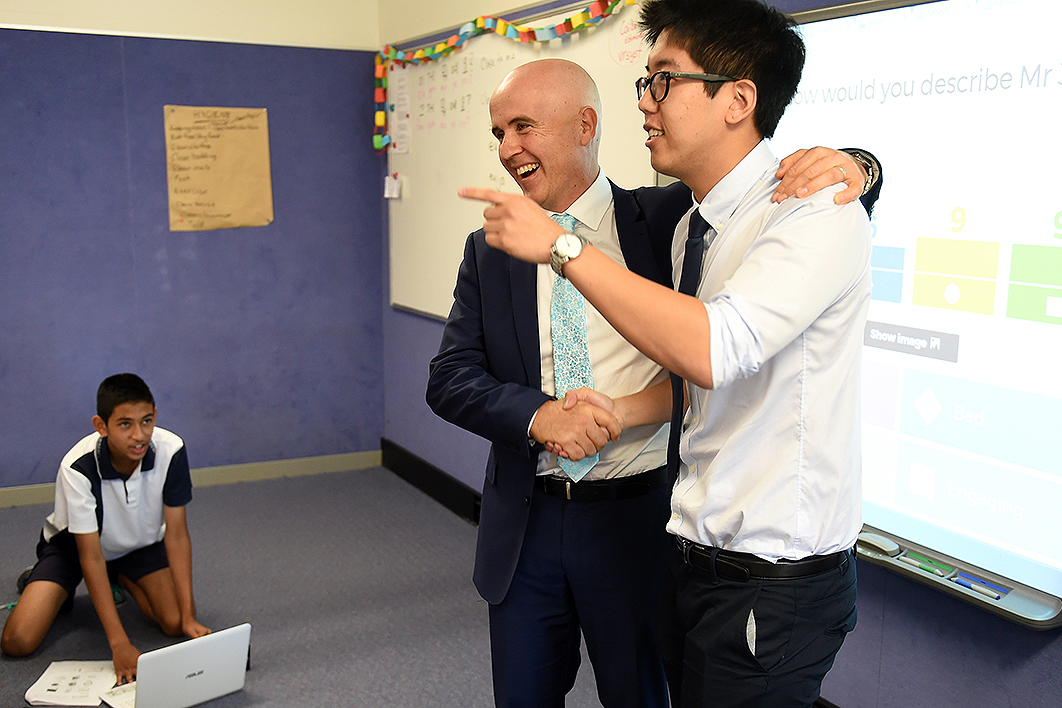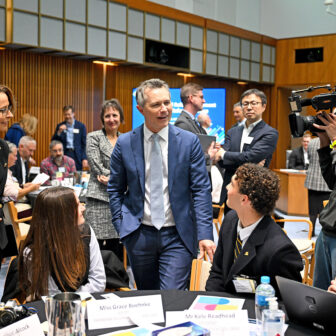He’s the Nat who gave a Gonski. In charge of schools in New South Wales from 2011 to 2017, Adrian Piccoli was a sometimes-lonely conservative voice championing needs-based school funding. Whether his stance was inspired by the experience of representing a rural seat in the state’s southwest, or by a Catholic sense of social justice, or simply by a temperament inclined to consensus, it’s almost impossible to imagine the Gonski reforms without him.
Consider two critical moments in the unfolding of school funding policy this decade. The first is in 2013. The Gillard government is in its dying days and the shadow education minister, Christopher Pyne, is attempting to sabotage the prime minister’s signature reform by calling on state Coalition counterparts not to sign Gonski funding agreements. Queensland, Western Australia and the Northern Territory heed Pyne’s call. Victoria wavers. A national initiative with just South Australia, Tasmania and the Australian Capital Territory on board won’t amount to much.
But then, in April, New South Wales signs on and Gillard now has the largest jurisdiction in the country, led by a Coalition government, on her side. And a National Party minister, Adrian Piccoli, is spruiking her policy, giving it serious bipartisan credibility. The centre holds and, a month before the 2013 federal election, opposition leader Tony Abbott feels enough pressure to join a purported “unity ticket” on the issue. When Pyne attempts a backflip only four months later, the public outcry quickly forces him into a humiliating reversal.
Fast-forward to May 2017, and the second moment. The Turnbull government resurrects Gonski, and the man himself appears in the flesh at a press conference for the benefit of the sceptics. The not-so-subtle subtext is that the government is jettisoning Pyne’s “money doesn’t matter” mantra. Money clearly does matter — otherwise the government wouldn’t be announcing a commitment to spend more of it. Again, Christopher Pyne is humiliated. Again, Piccoli’s role is critical.
For the past four years he had been calling on his federal Coalition counterparts to make an announcement just like this one: to commit to delivering the final two-thirds of Gonski money. Throughout that time, he consistently argued that getting the funding right is a precondition for a successful school system. In his own state, he implemented the needs-based Resource Allocation Model. And now, the new federal education minister, Simon Birmingham, clearly wants to be less like his predecessor and more like Piccoli.
Given Piccoli’s influence on the national conversation, it’s fitting that the new research outfit he is heading at the University of New South Wales has been called the Gonski Institute of Education. “It’s going to sit in between the academic world and the practice world,” Piccoli explains to me when I meet up with him at the National Library in Canberra. “Let’s take what schools and systems and leaders often need and then use research to address what they need. And the other way round.” If researchers are “doing really good stuff that has a distinct application, part of our role is to turn it into something that is actually usable by schools.”
Piccoli has come to Canberra to speak at an event hosted by the influential Grattan Institute looking at what the federal government should do to “drive improvement” in school education. The occasion has been prompted by the new review David Gonski is conducting into Australia’s schools, announced when Gonski joined Malcolm Turnbull and Simon Birmingham at that press conference last May. Where Gonski’s 2011 report was on funding (how much and who gets it), his new review will make recommendations on “how money is best used” to “achieve educational excellence.”
Total government funding to NSW public schools increased by $1073 per student between 2012–13 and 2015–16, and by $586 per student in private schools, according to the Productivity Commission’s latest Report on Government Services. This is the tangible part of Adrian Piccoli’s legacy. Disadvantaged children in New South Wales are now receiving a substantially better-resourced education. But has it made a difference? Given the current Gonski review’s emphasis on spending educational dollars efficiently and effectively, I ask Piccoli if there’s anything to show yet for the extra money.
“Last year’s NAPLAN results were the best results that New South Wales has ever had,” Piccoli replies. “Perhaps not across every testing domain but across quite a few of them. We had the premier’s priority, which was increasing the number of students in the top two [NAPLAN] bands by 8 per cent over the four years from 2015 to 2019. And now we’re already at that, two years ahead.” And, he continues, “just the other day the Closing the Gap report came out and it showed that since 2011, they’ve doubled the retention rate for Indigenous students in New South Wales. I think it’s still below the state average but it’s a doubling. So we’re seeing lots of improvement.”
These results aren’t definitive, but when many indicators show Australian schooling stagnating or even going backwards, the NSW data can only be seen as promising. So what does Piccoli — as the former minister who got a lot right when it came to the nexus between funding and outcomes — believe is the key to driving improvement in Australian schools?
His response is a surprising one. He suggests that maybe the real change needs to happen outside the school gates. “I think we have a cultural problem in Australia when it comes to education,” he says. “This is one of the things that is actually worthy of research. Is Australia suffering from twenty-five years of uninterrupted economic growth? Are we becoming complacent about how hard it is to get a job? Are we saying, ‘It doesn’t matter how well you do at school because, you know, you can [still] get a job?’”
Getting more pointed, he adds, “I think parents, I think the public — even the way that adults reflect upon schools and teachers in front of children, generally speaking, doesn’t respect schools and doesn’t respect teachers.” He presented the same view at the public forum that evening, eliciting a headline in the Sydney Morning Herald: “Former Education Minister Blames Complacent Parents for School Results.” That might be an over-simplification, but he surely knew what he was doing. He clearly sees a role for himself as a provocateur, prepared to tell the community, in effect, “Sure, you want schools to deliver all these things. And do it better than ever before. But it’s a two-way street.”
It’s an interesting — and potentially valuable — way to position himself. But, it’s not immediately clear where he hopes this kind of conversation might lead. Reassuringly, he is not suggesting that “you deliberately throw the economy into a recession” as a wake-up call to parents. And he recognises that complacency may be better than being “in the situation of some of these other countries where kids’ stress levels are through the roof.”
So, what exactly is he suggesting?
Piccoli is clearly frustrated about a range of signals that invite students (and their parents) to take school less seriously than he believes they should. “A number of universities don’t even require maths [at school] to do maths at university. I mean, to me, that just kind of does my head in,” he says. “Now, a big chunk of the kids in Year 12, in New South Wales, get a place at university before they even do the HSC exam. I’ve had lots of principals tell me that we should change the rules.”
Equally, Piccoli is concerned about the relative ease of entry into the teaching profession. “When you think about professions that are highly regarded, it’s pretty closely aligned with how difficult they are to get into,” he says. “You know, doctors, lawyers — you must be smart because they’re hard to get into. Whereas teaching — you know, ‘I didn’t get into anything else. It was my last option. Didn’t get into physio, so I went into teaching.’”
The result, Piccoli believes, is that teachers are not accorded the respect they deserve. “I mean if you sit around a table and say, ‘Oh yeah, what do you do for a living? I’m a school teacher.’ You’ll most likely hear somebody say, ‘Oh aren’t you lucky you get all those school holidays?’ But if you say, ‘I’m a doctor’, they’ll go, ‘Oh wow.’”
If Piccoli’s views of education — and human motivation — rely too heavily on instrumental self-interest, there’s an undeniable kernel of truth in what he is saying. And as minister he took significant steps to enhance the standing of the teaching profession. He instituted more demanding prerequisites for undergraduate teaching courses. To study to become a teacher, NSW school leavers now need to have three Band 5 HSC results (meaning that they must have ended up in the top 20 per cent of their cohort in at least three subjects, including English). “So we introduced a minimum standard,” he says, “which I hope is one of the things Gonski recommends.”
Piccoli thinks it is an example of where the Commonwealth can play a useful role in supporting the state and territory governments that run schools. “Where the federal government does it, you get more consistency nationally,” he says. “We now have the situation in New South Wales where we have higher standards than our neighbouring states, so some universities are getting round it by enrolling students from other states.” The Commonwealth’s responsibility for tertiary education means it doesn’t have to use the blunt instrument of HSC results and can allow universities some discretion about the criteria (academic results, aptitude tests, interviews, principal recommendations) they use to select the teachers of the future.
When Piccoli talks of a cultural problem in Australia, he is clearly thinking of high-performing Asian nations (as well as high-performing Australian children from Asian backgrounds), but he also appears to have Finland in mind. In December came the news that Piccoli would be joined at the Gonski Institute by the man who has done the most to spread the word about Finland’s success, Pasi Sahlberg. Thinking about a country like Finland helps make Piccoli’s point clearer. To take one example, Sahlberg has written about how his niece missed out on entry to a teaching degree. “Finnish primary school teacher education programs that lead to an advanced, research-based degree are so popular among young Finns,” he writes, “that only one in ten applicants is accepted each year.”
And yet Finnish teacher salaries differ little from Australia’s or those in comparable countries. There seems to be something else going on in relation to how the culture thinks about the importance of education. And it’s that “something else” that Adrian Piccoli wants us to think more deeply about.
On the eve of the release of a new Gonski report, the politics of school education involve the interplay of three distinct but related questions. How much do we need to spend? Who gets it? And what’s the smartest way of spending it?
The Turnbull government’s narrative is that the school funding wars are over. This time, it really is on a unity ticket. Everyone supports needs-based funding now, it says, so let’s move on (to the conversation about return on investment, which the new Gonski review is intended to engender).
Unfortunately, it’s not that simple. Struggling schools are still a very long way from entering needs-based funding nirvana. Gonski 2.0 delayed delivery of the full needs-based Schooling Resource Standard, or SRS, until 2027. And even more disconcertingly, most public schools may continue to be underfunded even then.
The crucial technicality is that the Commonwealth has taken responsibility for delivering 80 per cent of the SRS of private schools but only 20 per cent of public schools’ SRS, leaving the states and territories to make up the difference. The problem, as Piccoli acknowledges, is that “some states fund above 20 per cent of the SRS to non-government schools and below 80 per cent of the SRS to government schools.” In fact, on the current trajectory, public schools in New South Wales are on track to receive 91 per cent of their SRS in 2027, while Victorian public schools will be at just 86 per cent of their needs-based entitlement, Northern Territory public schools at 87 per cent, and public schools in other jurisdictions will also remain underfunded. Hundreds of private schools will continue to be overfunded. If that scenario unfolds, school funding in Australia will be neither nationally consistent nor needs-based nor sector-blind.
I ask Piccoli — as somebody with a deep commitment to equity, whose time in government focused on advocating and implementing needs-based funding — whether the states should respond to the Commonwealth’s 80–20 rules by realigning how they are allocating their funds to public and private schools. He bats the question away, saying, “This is what the Commonwealth is requiring states to do.”
The Commonwealth is negotiating funding agreements with the states that would require them to deliver 75 per cent of the SRS for public schools (not the full 80 per cent). It has not signalled any intention to require states to bring funding of private schools back down to 20 per cent of the SRS.
At this point, Piccoli only offers generalities. “Everyone goes, ‘We love needs-based funding.’ Well, that’s what it is. You can’t say, ‘I like needs-based funding for somebody else and not for me.’ It doesn’t work that way. You’re either for needs-based funding or you’re not for needs-based funding.”
That’s true. And the trouble is, unless we get all three things right — the right spending on the right students in the right way — we’re unlikely to change Australia’s educational culture. As head of the Gonski Institute, Adrian Piccoli is set to play a fascinating role in debates on all three questions. It’s only to be hoped that he directs his provocations at politicians as well as parents. •




